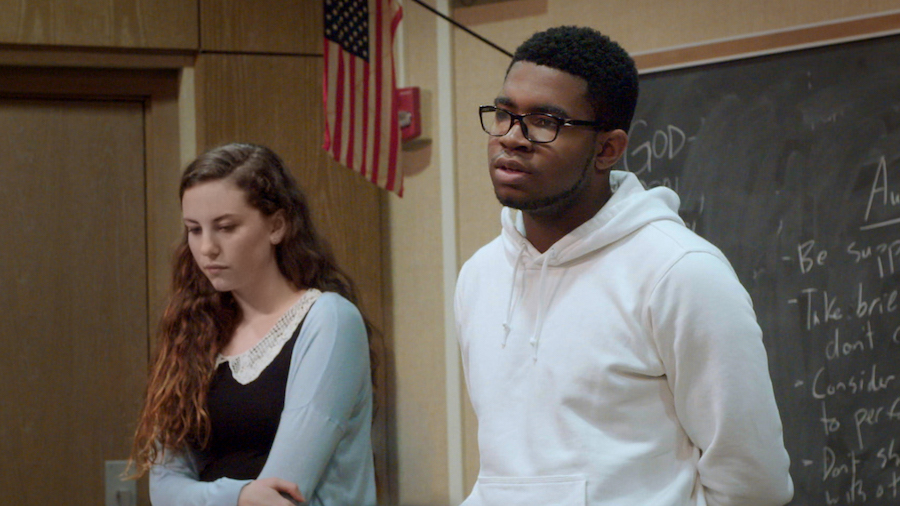So, we gotta talk about something. After my last recap where I detailed how Aaron Podolner, a physics teacher at Oak Park and River Forest High School, believes he is skilled at talking to his black students about race, I received a flurry of emails and Facebook messages. Some were from old high school classmates who, like me, had rolled their eyes at the series’ more ridiculous moments. Some shared their own difficult moments from our time at OPRF. A friend in New York who is expecting his first child said that America to Me made him realize the kinds of fights he’d have to wage as a black parent advocating for his child.
Then I received one Facebook message that stood out from all the rest. It was from Aaron Podolner. He sent me a link to a Google Doc explaining his perspective on his appearances in America to Me. (And to his autobiography, titled My Racial Autobiography with Questions for White Teachers of Black Students.) It details the lessons he has learned since the filming of the documentary and seeing his actions on television. It smacks of the classic reality TV line: “They only included the scenes that made me look [INSERT NEGATIVE QUALITY HERE]."
After watching episode 4, after seeing Podolner ask some of his black students to read and comment on his racial autobiography, which has ABSOLUTELY nothing to do with physics, and push back on criticism from Jada and dismiss colleague Jessica Stovall’s thoughts about dealing with race in the classroom, I don’t think I will respond to his Facebook message or friend him. I just don’t need that in my life. What I will say is this:
Aaron Podolner, IT’S. NOT. ABOUT. YOU.
As we see again in this episode, Podolner works very hard to be funny and “with it.” He wants to be seen as the type of white person who isn’t like those other white people. He seems to think that all it takes is just knowing a couple things to say about black women’s hair or hip-hop and black students will instantly feel comfortable around him. He even tells Charles’ mother that some people, not him, NEVER him, would say a black student getting a B is an accomplishment.
Podolner centers himself. He makes the whole conversation about him and his actions. It’s not about what the student needs. It’s about what Podolner wants. How he wants to be seen. How he wants to be received. How he wants to continue to use the word “racialize.” (That’s a word you should immediately know sounds bad when you say it out loud.) He takes how some students react to him, like Charles, and judges other students for not reacting like that.
Jada and I aren’t asking you to never talk about race. We’re asking you to listen to the complaints as much as the praise. And for God’s sake, stop bringing up black women’s hair so damn much. By treating it as some craaaazzzy thing you gotta get to the bottom of, you’re probably doing more to otherize the black women in your class than helping.
But there’s more to this episode than just Aaron Podolner. The brightest spot is Michael Byars, a behavioral intervention specialist at OPRF. Byars dedicates himself to standing at the school’s front doors every day, where he greets students. He believes it’s important that the students know that someone in the building respects them. He also follows up with students who get sent to detention or receive suspensions. In the episode, he stops into Jessica Stovall’s classroom to see Ke’Shawn, a junior. Byars asks Ke’Shawn to visit his office instead of study hall to do homework, or just to talk. Some of the deans don’t find these types of interactions effective, but Ke’Shawn shows some passion for his schoolwork in this episode. Something is getting through to him.
The episode also sees Grant, a freshman, joining theater and rehearsing for a play. Grant and his parents are a little uncomfortable with the play’s content, so Grant turns down a role and becomes an understudy (read: He sits in rehearsal and helps the other students memorize their lines). Personally, I spent most of my extracurricular time at OPRF in plays or musicals or desperately wanting to be in them. Mr. Noble even directed me in a night of one-acts and later, not only gave each of us a mixtape with the show’s songs but also wrote each of us long and sincere notes. The theater department wasn’t always the place where you could find a large group of black students, but I’m excited to see Grant finding his community.
The episode ends with the other extracurricular activities that consumed much of my time in high school. Mr. Kahn holds auditions for the school’s team that goes on to compete in the Chicago Teen Poetry Slam. Student Chanti has been having some trouble and doesn’t make the team, but Mr. Kahn creates a position for Chanti as a coach. Charles does make the team and predicts that this is the year the team will win. I hope the rest of the series is just a training montage about poetry.



